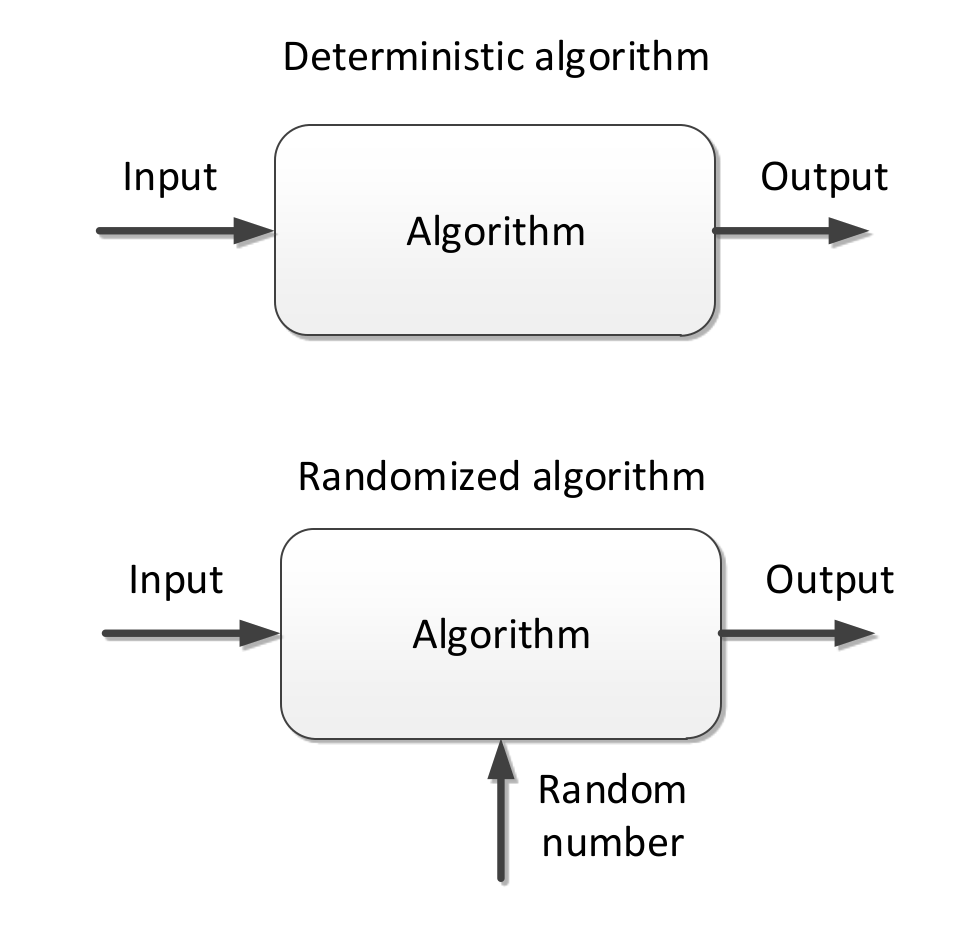Lecture 2: Randomised Algorithms
Categories of Algorithms
- Divide and conquer
- e.g. quicksort
- Dynamic programming
- Mathematic programming
- Linear programming
- Search and enumeration Algorithms
- Brute force algorithms
- enumerating all possible candidate solutions and check
- Improved brute force algorithms
- e.g. branch and bound algorithms
- Heuristic Algorithms
- Local search
- e.g Greedy search
- Randomised Algorithms
- Include Evolutionary Computation etc.
- Local search
- Brute force algorithms
Heuristic Algorithms
- Heauristic: A (usually simple) algorithm that produces good enough solutions for a problem in a reasonable time frame
- A Heuristic is a rule of thumb
- Solutions are usually non-optimal but satisfactory
- This makes them faster
- Trade off is optimality or completeness
- Usually used to solve high complexity problems
- Includes deterministic e.g. local search and randomised algorithms
Randomised Algorithms
- Randomised Algorithm: An algorithm that uses a heuristic to make random choices during execution to produce a result.

There are 2 categories of randomised algorithms:
- Using random numbers to find a solution to a problem
- Using random numbers to improve a solution to a problem
Category 1:
Las Vegas Algorithm
Problem: given an array of elements, find the first element which has a value equal to
begin repeat Randomly select one element a out of n elements until a==x end
Monte Carlo Algorithm
For the same problem we can also use the Monte Carlo algorithm
begin i := 0 repeat Randomly select one element a out of n elements i := i + 1 until (a==x) || (i==k) end
Monte Carlo vs Las Vegas
The Las Vegas algorithm is a randomised algorithm that always gives correct results. The running time varies from run to run.
The Monte Carlo algorithm is also a randomised algorithm whose running time is deterministic but results may be incorrect with a small probability
Differences:
- Monte Carlo has a fixed numbers of steps
- Las Vegas algorithm runs in an infinite loop until the correct results are found
- Las Vegas algorithm can be converted into the Monte Carlo algorithm by using early termination.
Advantages of Randomised Algorithms
For a deterministic linear search algorithm, such as iterative search:
- The average run time complexity is
- The worse case run time complexity is
For the Las Vegas algorithm:
- The average run time complexity is dependant on the input
- The worse time complexity is unbounded. i.e there are cases where the run time is relatively high
For the Monte Carlo algorithm:
- The run time for any situation is fixed as
- However, there is some probability of the wrong result being returned
Solving the Nuts and Bolts Problem using Randomised Algorithms
A disorganised carpenter has a collection of nuts of distinct sizes and bolts. They want to find the corresponding pairs of bolts and nuts.
Each nut matches exactly one bolt (and vice versa). They can only compare nuts to bolts (not nuts to nuts or bolts to bolts)
The brute force approach to solving this problem would be to compare each bolt to each nut with a time complexity of
We can use a quicksort approach to speedup the process.
Aside
The sorting problem: given and array of numbers, sort the numbers in increasing order.
Quicksort Algorithm:
less,equal, greater := three empty arrays if length(array) > 1 { pivot := select an element of array for each x in array { if x < pivot add x to less if x = pivot add x to equal if x > pivot add x to greater } } quicksort(less) quicksort(greater) array := concatenate(less,equal,greater)
Randomised Quicksort Algorithm
The time complexity of the deterministic quicksort algorithm is on average for a random permutation array
The worst case complexity is , this occurs when an already sorted array is entered
For the randomised quicksort algorithm: selecting a pivot point randomly
- Average run time complexity:
- Worst case:
Solving the problem using this apporach is not trivial and a proof can be found here
Applications of Randomised Algorithms
- Mathematics
- Number theory
- Primality test
- Computational Geometry: graph algorithms
- Minimum cut
- Number theory
- Computer Science
- Data Analysis
- PageRank
- Parallel Computing
- Deadlock avoidance
- Optimisation
- Nature inspired search and Search algorithms
- Data Analysis
- Computational Biology: DNA read alignment
Advantages and Disadvantages of Randomised Algorithms
Advantages
- Simplicity: usually easy to implement
- Performance: usually produce (near) optimum solutions with a high probability
Disadvantages
- Getting a wrong answer is a possibility
- Can be solved by repeating the algorithm
- Difficult to analyse the running time and probability of getting an incorrect solution
- Impossible to be truly random